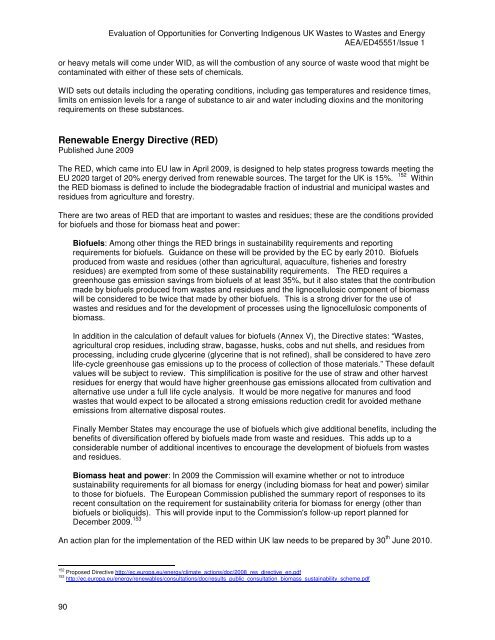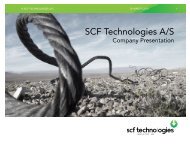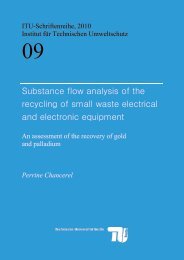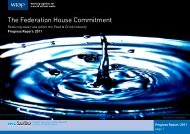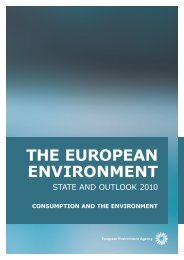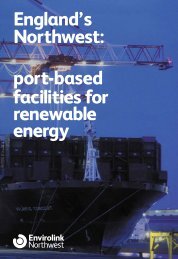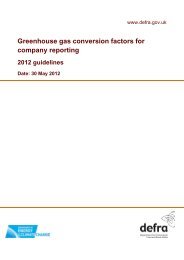to read the full report - Ecolateral by Peter Jones
to read the full report - Ecolateral by Peter Jones
to read the full report - Ecolateral by Peter Jones
You also want an ePaper? Increase the reach of your titles
YUMPU automatically turns print PDFs into web optimized ePapers that Google loves.
90<br />
Evaluation of Opportunities for Converting Indigenous UK Wastes <strong>to</strong> Wastes and Energy<br />
AEA/ED45551/Issue 1<br />
or heavy metals will come under WID, as will <strong>the</strong> combustion of any source of waste wood that might be<br />
contaminated with ei<strong>the</strong>r of <strong>the</strong>se sets of chemicals.<br />
WID sets out details including <strong>the</strong> operating conditions, including gas temperatures and residence times,<br />
limits on emission levels for a range of substance <strong>to</strong> air and water including dioxins and <strong>the</strong> moni<strong>to</strong>ring<br />
requirements on <strong>the</strong>se substances.<br />
Renewable Energy Directive (RED)<br />
Published June 2009<br />
The RED, which came in<strong>to</strong> EU law in April 2009, is designed <strong>to</strong> help states progress <strong>to</strong>wards meeting <strong>the</strong><br />
EU 2020 target of 20% energy derived from renewable sources. The target for <strong>the</strong> UK is 15%. 152 Within<br />
<strong>the</strong> RED biomass is defined <strong>to</strong> include <strong>the</strong> biodegradable fraction of industrial and municipal wastes and<br />
residues from agriculture and forestry.<br />
There are two areas of RED that are important <strong>to</strong> wastes and residues; <strong>the</strong>se are <strong>the</strong> conditions provided<br />
for biofuels and those for biomass heat and power:<br />
Biofuels: Among o<strong>the</strong>r things <strong>the</strong> RED brings in sustainability requirements and <strong>report</strong>ing<br />
requirements for biofuels. Guidance on <strong>the</strong>se will be provided <strong>by</strong> <strong>the</strong> EC <strong>by</strong> early 2010. Biofuels<br />
produced from waste and residues (o<strong>the</strong>r than agricultural, aquaculture, fisheries and forestry<br />
residues) are exempted from some of <strong>the</strong>se sustainability requirements. The RED requires a<br />
greenhouse gas emission savings from biofuels of at least 35%, but it also states that <strong>the</strong> contribution<br />
made <strong>by</strong> biofuels produced from wastes and residues and <strong>the</strong> lignocellulosic component of biomass<br />
will be considered <strong>to</strong> be twice that made <strong>by</strong> o<strong>the</strong>r biofuels. This is a strong driver for <strong>the</strong> use of<br />
wastes and residues and for <strong>the</strong> development of processes using <strong>the</strong> lignocellulosic components of<br />
biomass.<br />
In addition in <strong>the</strong> calculation of default values for biofuels (Annex V), <strong>the</strong> Directive states: “Wastes,<br />
agricultural crop residues, including straw, bagasse, husks, cobs and nut shells, and residues from<br />
processing, including crude glycerine (glycerine that is not refined), shall be considered <strong>to</strong> have zero<br />
life-cycle greenhouse gas emissions up <strong>to</strong> <strong>the</strong> process of collection of those materials.” These default<br />
values will be subject <strong>to</strong> review. This simplification is positive for <strong>the</strong> use of straw and o<strong>the</strong>r harvest<br />
residues for energy that would have higher greenhouse gas emissions allocated from cultivation and<br />
alternative use under a <strong>full</strong> life cycle analysis. It would be more negative for manures and food<br />
wastes that would expect <strong>to</strong> be allocated a strong emissions reduction credit for avoided methane<br />
emissions from alternative disposal routes.<br />
Finally Member States may encourage <strong>the</strong> use of biofuels which give additional benefits, including <strong>the</strong><br />
benefits of diversification offered <strong>by</strong> biofuels made from waste and residues. This adds up <strong>to</strong> a<br />
considerable number of additional incentives <strong>to</strong> encourage <strong>the</strong> development of biofuels from wastes<br />
and residues.<br />
Biomass heat and power: In 2009 <strong>the</strong> Commission will examine whe<strong>the</strong>r or not <strong>to</strong> introduce<br />
sustainability requirements for all biomass for energy (including biomass for heat and power) similar<br />
<strong>to</strong> those for biofuels. The European Commission published <strong>the</strong> summary <strong>report</strong> of responses <strong>to</strong> its<br />
recent consultation on <strong>the</strong> requirement for sustainability criteria for biomass for energy (o<strong>the</strong>r than<br />
biofuels or bioliquids). This will provide input <strong>to</strong> <strong>the</strong> Commission's follow-up <strong>report</strong> planned for<br />
December 2009. 153<br />
An action plan for <strong>the</strong> implementation of <strong>the</strong> RED within UK law needs <strong>to</strong> be prepared <strong>by</strong> 30 th June 2010.<br />
152 Proposed Directive http://ec.europa.eu/energy/climate_actions/doc/2008_res_directive_en.pdf<br />
153 http://ec.europa.eu/energy/renewables/consultations/doc/results_public_consultation_biomass_sustainability_scheme.pdf


